Asustor AS7008T 8-bay Intel Haswell SMB NAS Review
by Ganesh T S on November 30, 2014 5:05 PM ESTEncryption Support Evaluation
Consumers looking for encryption capabilities can opt to encrypt a iSCSI share with TrueCrypt or some in-built encryption mechanism in the client OS. However, if requirements dictate that the data must be shared across multiple users / computers, relying on encryption in the NAS is the best way to move forward. Most NAS vendors use the industry-standard 256-bit AES encryption algorithm. One approach is to encrypt only a particular shared folder while the other approach is to encrypt the full volume. ADM doesn't support encrypted volumes, but only encrypted shared folders.
On the hardware side, encryption support can be in the form of specialized hardware blocks in the SoC (common in ARM / PowerPC based NAS units). In x86-based systems, accelerated encryption support is dependent on whether the AES-NI instruction is available on the host CPU. The Core i3-4330 has AES-NI support. Assuming that ADM takes advantage of AES-NI, we should see very little performance penalty for encrypted folders.
The graphs below compare the single client access numbers for an encrypted CIFS share for various 8-bay NAS units that have been evaluated previously. For the AS7008T alone, we have the numbers from a non-encrypted share for the same workload. This allows us to check the encryption penalty easily.
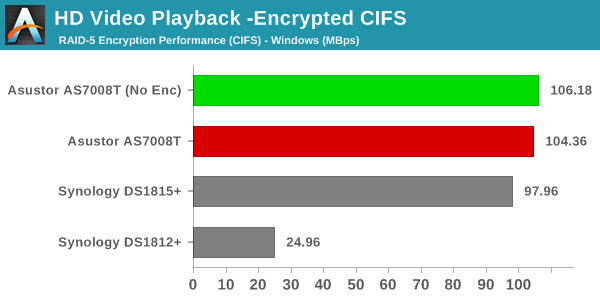
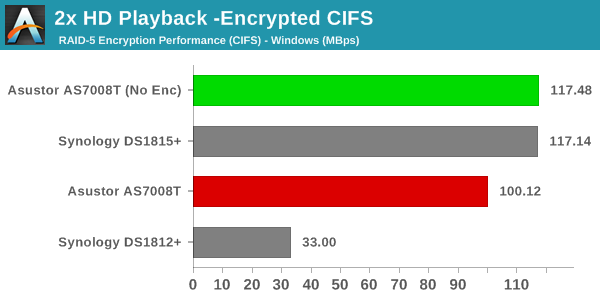
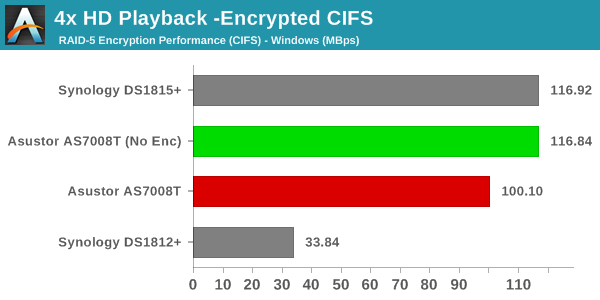
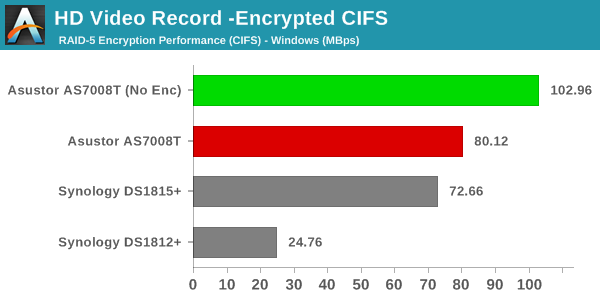
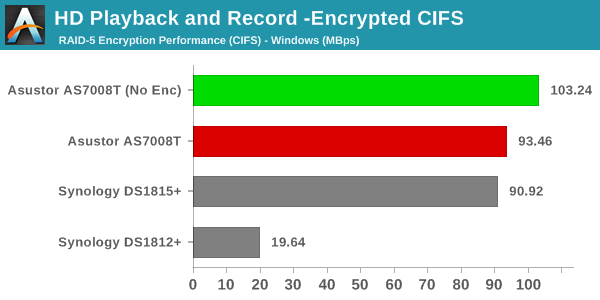
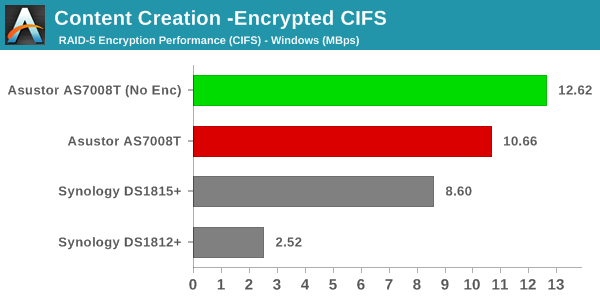
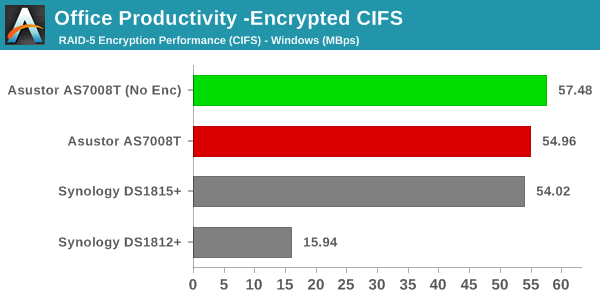
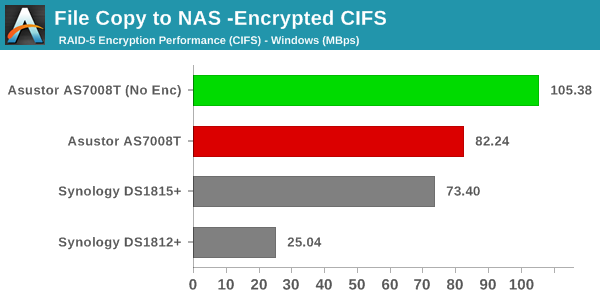
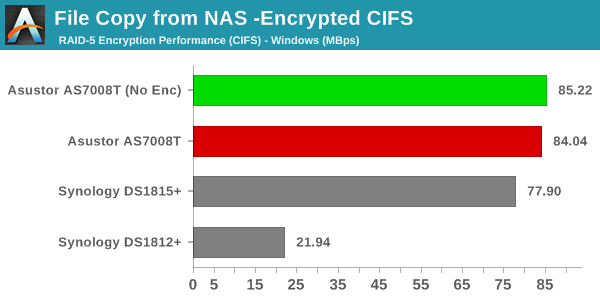
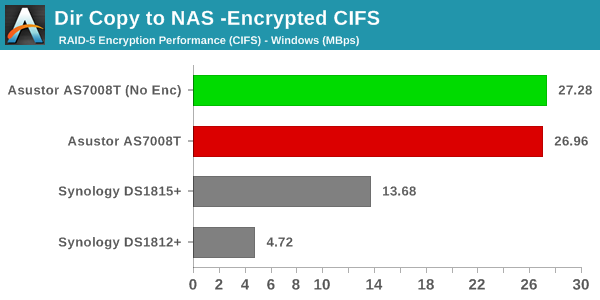
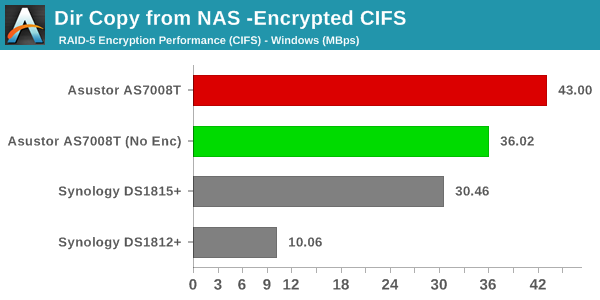
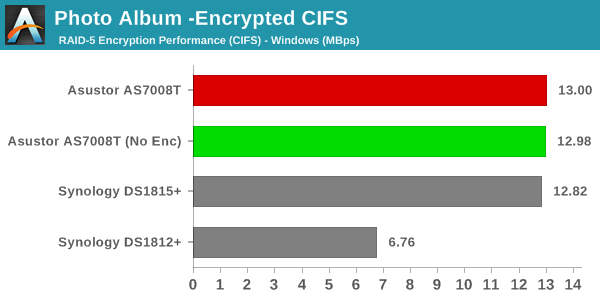
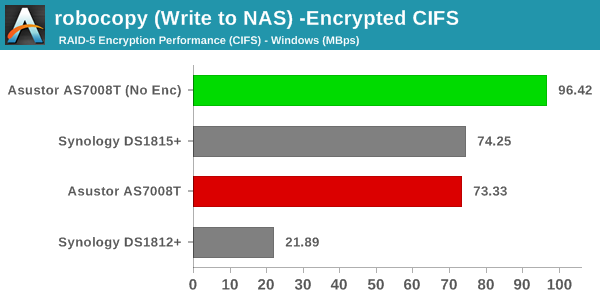
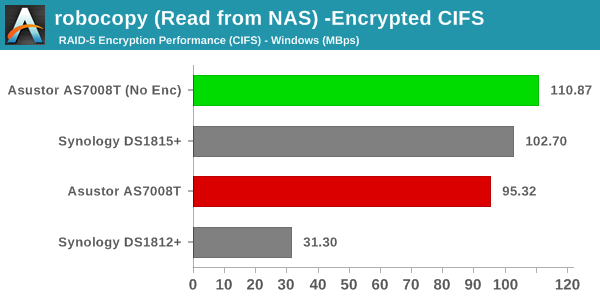
As expected, the encryption penalty is minimal. The DS1815+ fares a bit better in a few workloads, but, for the most part, things play out in a manner similar to what we saw in the single client CIFS performance section.










29 Comments
View All Comments
Lycoming360 - Sunday, November 30, 2014 - link
I'd love to have that rebuild speed in my Synology unit. But, you certainly do pay for that speed!Jcowley - Sunday, November 30, 2014 - link
Maybe I don't understand but what are you getting for your $1500 over building your own NAS with equivalent/better hardware?I understand the whole off-the-shelf and it just works aspect is worth a bit but $1500 seems extortionately high for what is essential just hot-swap bays on top of anything you could build yourself.
bill.rookard - Sunday, November 30, 2014 - link
I agree, I have my NAS, rackmount case (no hot swap sadly), and 5 2tb drives for a total of about $1000.00. (Drives were purchased at a slight premium to what they can be had for now).DigitalFreak - Monday, December 1, 2014 - link
Here we go again. Not everyone wants to spend the time to research, build and install their own NAS. Having a single point of contact for support and software updates is also worth the $$ to some people and especially businesses.That being said, I do think the Asus is overpriced compared to a Synology, even taking into consideration the Haswell hardware.
bill.rookard - Monday, December 1, 2014 - link
I don't disagree at all with that, there certainly is (as evidenced by the expanding options by various companies) a market for a one-stop, plug in the drives, connect the ethernet cable and power it up units. People are even willing to pay a premium for such a device in a space efficient package.However, any decent tech guy should be able to put together a decent simple Linux-based box (which is what FreeNAS is based off of) for file servicing. These days, with the hardware which is available, the bar to putting together something small, or large, power efficient, and rock solid is much lower and much less expensive than many people realize.
PrimozR - Monday, December 1, 2014 - link
FreeNAS is based off FreeBSD. Still Unix, not Linux though.bill.rookard - Monday, December 1, 2014 - link
Yes, I know it's based off of FreeBSD... technicalities... :) I guess I should have, since I was just using a basic generalization of the type of OS, that it was 'based of *nix' since they share very similar underpinnings.Black Obsidian - Monday, December 1, 2014 - link
I don't think anyone is disputing that SOME premium is justified by the value of a pre-built, supported machine. The question seems to revolve around how MUCH premium is justified, especially in larger NAS boxes like this one.Having recently built a media server with virtually identical specs, I can say that with Asustor you're paying a 200% markup for the convenience of pre-built and support. Which seems a bit steep, especially from Asustor, which doesn't have the brand cachet of Synology.
peterfares - Monday, December 1, 2014 - link
Here we go again. People thinking these insane markups are justifiable.peterfares - Monday, December 1, 2014 - link
I'm sure it makes sense in SOME cases to buy these prebuilts but some people seem to really over-value their time.